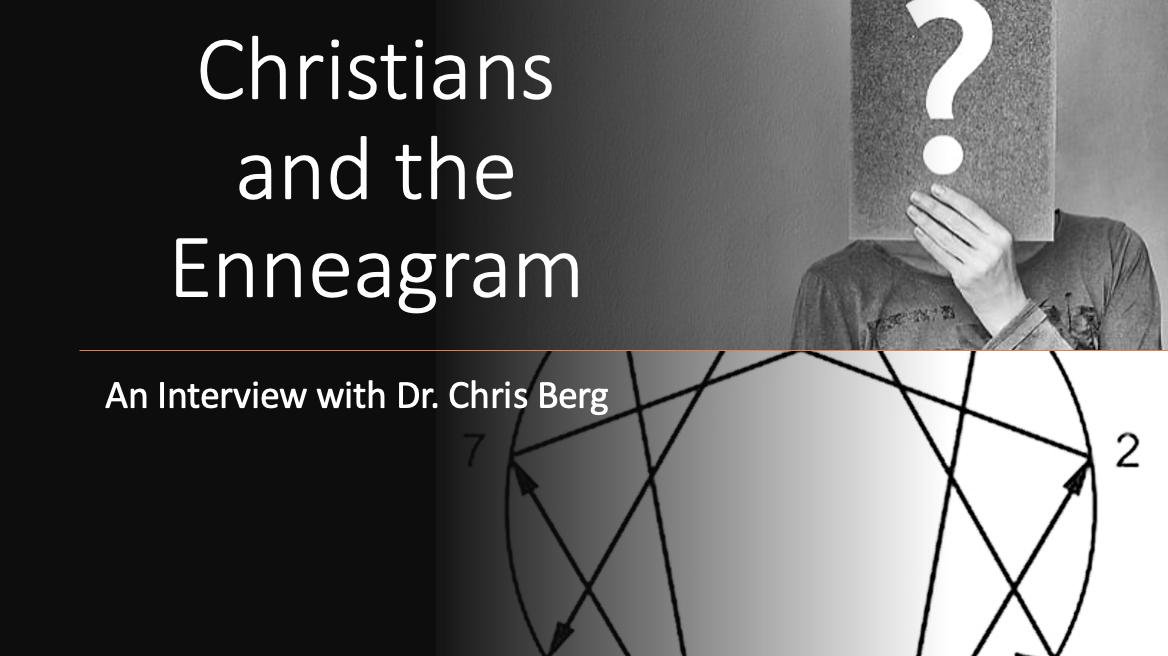The Enneagram has been a HUGE topic of conversation in Christian circles and beyond. My friend Dr. Chris Berg (who graduated from our Biola/Talbot Apologetics program), recently did his doctoral dissertation on it. I asked him to give some insight into what it is and as to why he has some concerns about it. While there are a range of different Christian approaches to understanding and utilizing the Enneagram, I hope this will be insightful for you.
Sean McDowell: The Enneagram is relatively new in protestant Christian circles. For those who haven’t heard of it, what is the Enneagram and why do people find it helpful?
Dr. Chris Berg: Christians who are only somewhat familiar with the Enneagram often have the misconception that it is a new personality test, in a similar vein to Myers-Briggs or DISC. In fact, the Enneagram is defined by its top practitioners as a set of ancient teachings that describe the nine ways people get lost and the nine ways people can find their way back to God. Most Christians do not initially pick up the Enneagram for this purpose; they are typically intrigued by the insights it offers for their personal life. Enneagram teachers often tout its benefits on marriage relationships, social and work relationships, and self-understanding. As people spend more time with the Enneagram and its teachers, they eventually learn about the spiritual benefits the Enneagram was designed to produce – becoming closer to God and becoming a better person.
MCDOWELL: People have different experiences and different levels of engagement with the Enneagram. What are the predominant ways in which people use and engage with the Enneagram?
DR. BERG: There are generally three levels at which people engage with the Enneagram. Typically, people begin with casual engagement in which they find out their Enneagram number, learn what their primary weakness is, and apply basic Enneagram advice to their thinking and behavior. For those who find the Enneagram very helpful, they often discover there is an entire community devoted to helping people live an “Enneagram Lifestyle.” In this community, you can listen to your number’s songs, appreciate your number’s artwork, and read your number’s best Bible verses. Members of this lifestyle community tend to rely heavily on the practical aspects of Enneagram teaching for all areas of their life. For those who discover the spiritual aspects of the Enneagram, it is common to embrace the Enneagram’s worldview. This third level involves the adoption of the teachings of Richard Rohr and Christopher Heuertz and their theology as represented in their books.
MCDOWELLL: The Christian Enneagram has the support of major Christian publishers, the largest churches in America, and thousands of positive, life-changing testimonies. Is there any reason why people should investigate the Christian version of the Enneagram before engaging with it?
DR. BERG: As Christians, it is important to investigate any new practice or teaching prior to use, and the Enneagram is no different. Engagement with the Enneagram at the spiritual level involves adopting the worldview presented by its teachers. The primary Christian Enneagram teacher, Richard Rohr, denies a number of central Christian doctrines: 1) denial of the Trinity and classical theism and support of panentheism (God is incarnate within creation), 2) denial of penal substitutionary atonement and affirmation of salvation through literally merging with God, and 3) denial of Jesus as the unique Messiah and assertion that all people can attain Christ-consciousness (recognition of one’s own status as a Christ). The more that one engages with the Enneagram at a spiritual level, the more one can be drawn away from orthodox Christian doctrine.
At the lifestyle level, the greatest risk is replacing scriptural knowledge with the ancient wisdom of the Enneagram. Additionally, the Enneagram heavily emphasizes self-work at this level, which can easily become a works-based method of salvation. With engagement at the surface level, the greatest danger is opening oneself up to a greater degree of engagement. Also, upon examination, the advice the Enneagram gives is virtually indistinguishable from advice given by horoscopes, astrology, and numerology. So there is a question as to whether a Christian should utilize astrological advice over Scripture.
MCDOWELL: Why did you choose to write a book on the topic of the Christian Enneagram?
DR. BERG: At the moment, there are many popular-level books warning about the Enneagram and its teachers that are very helpful for Christians. However, none of them give a full theological breakdown of the Enneagram in comparison to Christian and New Age theology. I wanted to provide Christians with a framework to assess not only the Enneagram, but any practice, to determine if it holds to biblical theology or New Age theology. I believe that through the method presented in my book, Christians will be able to make well-informed and well-educated choices about whether or not they should utilize tools like the Enneagram. It is my hope that this book will help Christians be better versed in what they believe, be more aware of New Age doctrine, and be able to discern between the two.

